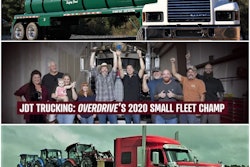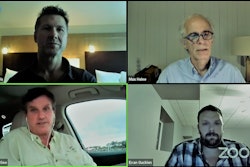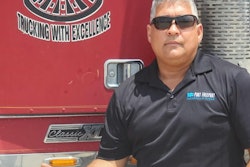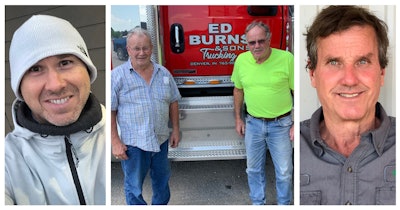 Representing the finalists, from left: James Davis of James Davis Trucking; Terry Burns, right, general manager of Ed Burns & Sons Trucking, with his brother, Mike Burns; and John McGee of John McGee Trucking.
Representing the finalists, from left: James Davis of James Davis Trucking; Terry Burns, right, general manager of Ed Burns & Sons Trucking, with his brother, Mike Burns; and John McGee of John McGee Trucking.There was no shortage of advice on running a small fleet to glean from the three finalists in the first Overdrive‘s Small Fleet Champ award program. After the Aug. 28 announcement of the winner, James Davis of JDT Trucking, Senior Editor Todd Dills recapped many of the finalists’ tips — controlling costs, delegating responsibilities, etc. I did, too.
A traditional edge that small fleets have over large ones is that the culture is more family-like. Drivers are known by name, not a number, as it’s often put. That’s no doubt true in many small fleets, but the best extend the personal touch much further, which is a big part of what we intended to recognize with this annual competition. Here are some examples from Davis and the other finalists:
As the coronavirus pandemic derailed much of trucking in the spring, especially in certain niches, JDT, which hauls construction materials, felt the heat. But Davis was able to keep his drivers almost as busy as normal, even supplementing pay in some cases. Likewise, Indiana-based contest finalist Ed Burns & Sons used rotating days and other planning to avoid layoffs and came close to sustaining drivers’ regular pay, said Evan Guckien, operations and dispatch manager.

As JDT began to expand years ago, Davis added health insurance, including vision and chiropractic coverage. Dental coverage and retirement benefits followed. Ed Burns & Sons and finalist John McGee Trucking of Louisiana also offer strong benefits packages, and they were hardly alone among the 200-plus entries in the competition. I was shocked by how many fleets offer benefits that are quite competitive with those of big fleets.
Like most small-fleet owners, Davis started out as a driver. Unlike most owners of fleets as big as his (nearly 30 trucks), he still gets behind the wheel. “He’s a driver at heart,” said Joel Sodorff, a JDT company driver. “He relates to us on a different level than someone who’s not actually spent time out here.” It’s not unusual for Davis to text drivers about something other than business, said driver Chris Cooper. “It’s more of a personal relationship than a boss-employee relationship.”
Even after Davis hired people for key management positions to delegate his growing responsibilities, he didn’t retreat to a private office. “I still sit on the floor in the middle of everything,” he said.
Among the rarefied world of show truck competition, it’s not unusual to find a small fleet that keeps a truck or two in shape for showing. At JDT, though, about half of its trucks are ready for custom competition. Getting to drive these beauties is no small thing to most drivers.
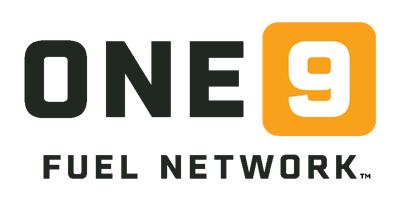 The Overdrive Small Fleet Champ award is sponsored by the One9 Fuel Network, which is geared toward small fleets and owner-operators, offering credit and fuel stop options. One9 is produced by the Pilot Company.
The Overdrive Small Fleet Champ award is sponsored by the One9 Fuel Network, which is geared toward small fleets and owner-operators, offering credit and fuel stop options. One9 is produced by the Pilot Company.Of course, such practices are a two-way street. What benefits the drivers also benefits the fleet by helping it attract and hold onto the best, and that’s fine.
McGee, who runs an oil-field services tank fleet, put it well: “I stand firm in my belief that the Golden Rule will prevail every time. It’s about how you treat people, whether they’re your customers, they’re your employees, or your vendors.”
There’s a lot of solitude in long-haul driving, but trucking is still about relationships, like any business. Those who succeed, whether managing or driving, have learned to keep that in mind.

